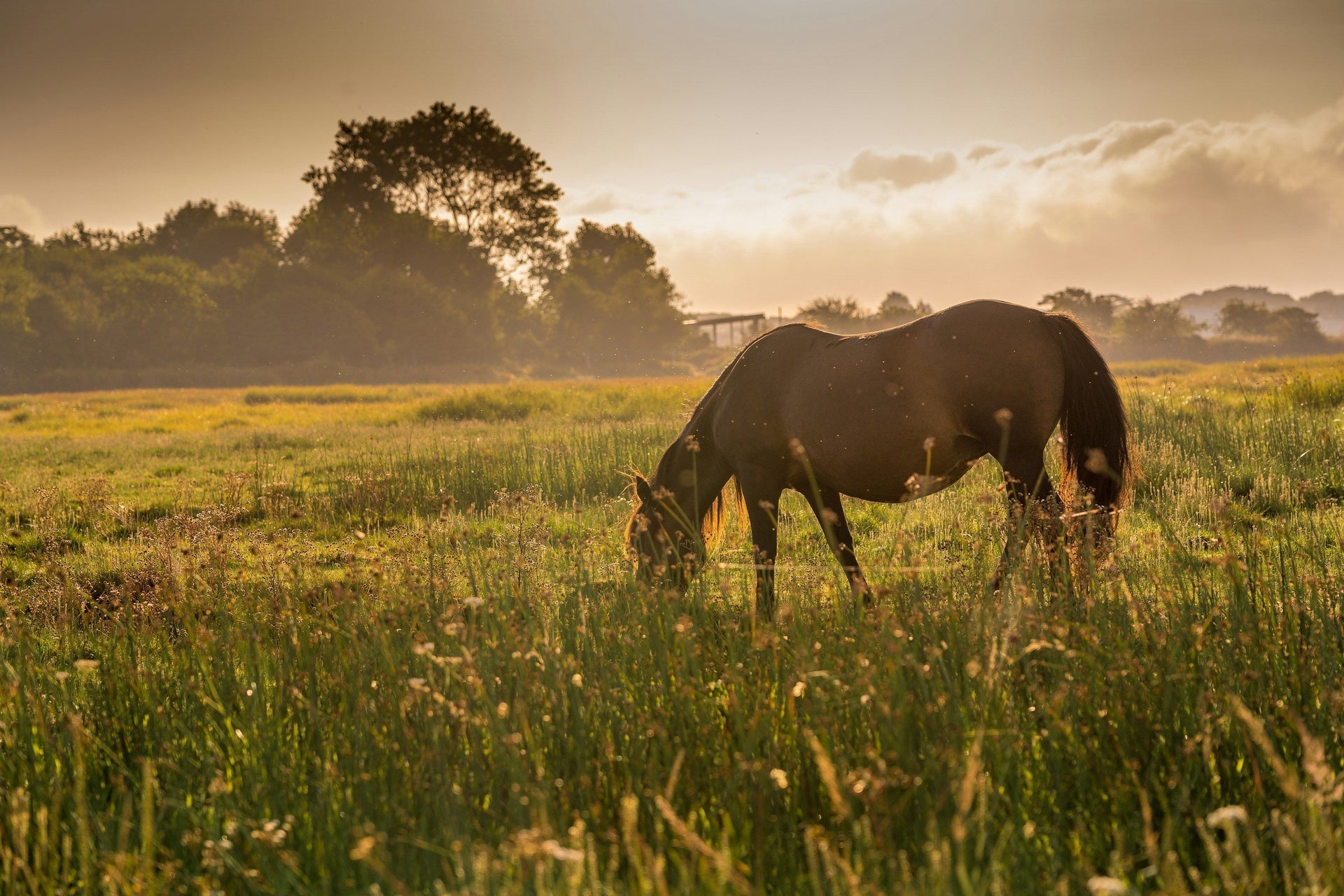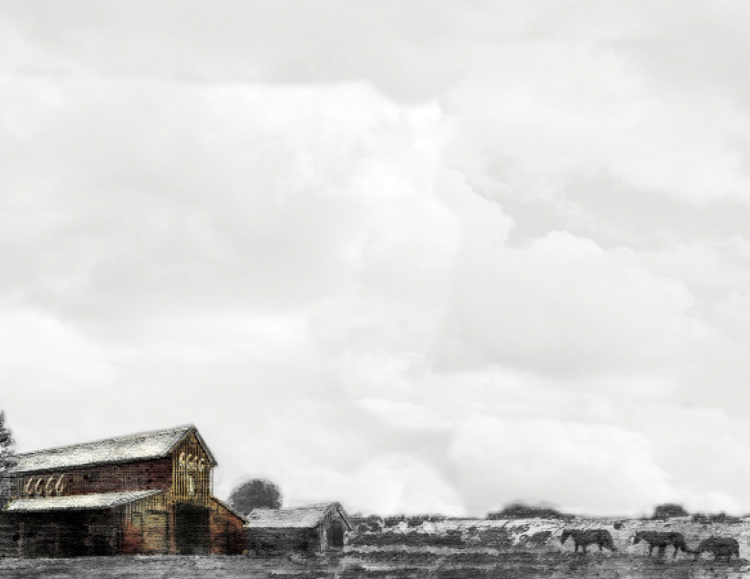The Power of B Vitamins for Horses
A horse needs nutrients that fall into six categories: water, protein, carbohydrate, fat, vitamins and minerals.
Vitamins are essential micronutrients made of organic elements necessary for essential metabolic functions and disease prevention. Horses only require a small amount of vitamins to meet their nutritional needs, and they can either be fat soluble or water soluble.
B vitamins are water-soluble vitamins, which means they are not stored in the body, and any excess not absorbed by the body is excreted in urine. Water-soluble vitamins consequently require continual replenishment.
Vitamin C is also water soluble. This is in contrast to fat-soluble vitamins such as A, D, E and K, which are stored in the body, and while some excess is eliminated in feces, excess can build up.
Horses can make some needed vitamins on their own, including C, D, K and some B vitamins, so they don’t always need to be supplemented. But a senior horse, performance horse, or a stressed horse due to injury, illness, stress or another digestion condition will benefit from vitamin supplements.
A group of B vitamins is also called Vitamin B complex. B vitamins for horses can help if horses are undergoing stress. Vitamin B complex for horses can also help reduce fatigue during exercise.
There are eight B vitamins that are considered essential, because they need to be provided in your horse’s diet. Thankfully, deficiencies are rare, but if you’re wanting to offer your horse a complete plane of nutrition, it’s wise to consider supplementing some of them.
- B1: Thiamine. Thiamine helps process proteins, fats and carbohydrates, and assists in nerve transmission and stimulation. Thiamine can help calm a nervous horse. A horse gets thiamine from microbial synthesis, cereal grains, and grain by-products.
- B2: Riboflavin. Riboflavin helps with energy production, metabolizing lipids and certain drugs. It naturally occurs in alfalfa hay, and in somewhat lower amounts in grass hays. Fiber fermentation in your horse’s hindgut also produces this nutrient. A horse gets riboflavin from microbial synthesis and forages.
- B3: Niacin. Niacin aids in energy metabolism. Horses get niacin from legumes and microbial synthesis.
- B5: Pantothenic Acid. This vitamin aids in the metabolism of proteins, fats and carbohydrates.
- B6: Pyridoxine. Pyridoxine helps with amino acid synthesis and degradation, as well as glycogen utilization, fat metabolism and producing norepinephrine and epinephrine.
- B7: Biotin. Biotin helps with hoof growth and health, as well as chemical reactions associated with metabolism and cell proliferation. This is the most important of the B vitamins for horse owners and can help prevent hoof cracking and weakness. Horses get biotin from fresh forages and microbial synthesis.
- B9: Folic Acid. Also known as folate, folic acid helps with DNA synthesis, as well as rapid cell growth and development. Fresh forages provide folate to horses.
- B12: Cyanocobalamin. This vitamin helps with manufacturing red blood cells, and metabolizing proteins, carbohydrates and fats. It’s vital for utilizing the fatty acid called propionate, which makes methionine. B12 can help improve your horse’s appetite, reduce chances of anemia, and aid in performance.
How Does My Horse Get B Vitamins?
If your horse eats a balanced diet of green forages or fresh, good quality hay, particularly alfalfa, they may not need additional supplements of vitamins. But a good vitamin supplement can fill in any holes.
Most of your horse’s digestion happens in his hindgut, which includes the cecum and colon, and is the site for fibrous carbohydrate digestion. Bacteria in the hindgut helps release nutrients, while converting fiber into energy via fermentation. Vitamins B and K are synthesized in the hindgut through this process.
Does My Horse Need a Vitamin B Supplement?
Horses don’t usually show signs of a Vitamin B deficiency, but sometimes offering a B-Vitamin complex supplement can help your horse be at their best for performance. A horse in one of the following situations may benefit from Vitamin B supplementation:
- If your horse is on a high grain, low forage diet or is consuming poor quality foliage
- If he’s got a reduced appetite
- If he’s on antibiotics that affect his hindgut bacteria
- If he has diarrhea or parasites
- If he’s very young, or if he’s very old;
- If he’s in a high stress situation such as travel and competition
- If he’s a performance horse, under a heavy workload
If you have any concerns about your horse’s nutritional needs being met, consult your veterinarian or equine nutritionist.
What to Look For in an Equine B Vitamin Supplement
B Vitamin supplements can be negatively affected by heat, light, and humidity. And not all B Vitamins are compatible with each other—thiamine should not be included with riboflavin, and neither should be included in the same supplement with B12.
To combat these issues, vitamins can be coated with wax, sugar or gum to protect them and to preserve their efficacy.
6666 Electrolyte Paste and 6666 Electrolyte Recover both contain B Vitamins as well as trace minerals. This is one way to replenish essential electrolytes lost through sweat, as well as give your horse an added boost with B Vitamins.
Since many horses requiring electrolytes are performing and under stress, the 6666 Electrolytes help solve two issues in one supplement.
It’s ideal for horses working in hot or humid weather, traveling, and in moderate to intense work. The Paste is convenient for administering on the road, while Recover is perfect for daily top-dressing on your horse’s feed.
Read More:
Nutrition: The Key to Unlocking Your Horse's Health
An Overview of Vitamin Requirements of the Domestic Horse
The Role of Micronutrients in Equine Nutrition
The Equine Gastro-Intestinal Tract
Photo by Nick Fewings on Unsplash


